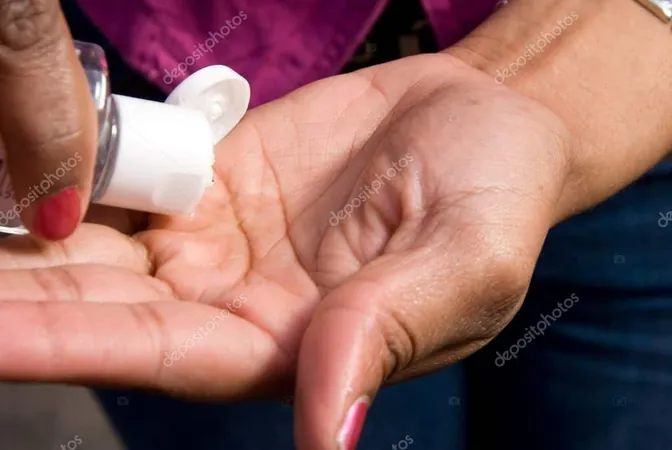
Are We Creating Superbugs with Our Disinfectant Obsession Post-Pandemic?
2025-04-14
Author: John Tan
The Pandemic's Impact on Hygiene: A Double-Edged Sword
The COVID-19 pandemic has transformed our hygiene habits, making aggressive cleaning routines commonplace as families scrambled to prevent viral spread. Kitchens became epicenters of disinfection, driven by concerns over surfaces carrying germs. However, while these measures seemed essential at the time, new research is sounding alarms about their potential dangers.
The Superbug Threat: A Dangerous Side Effect of Over-Cleaning
The rampant use of antimicrobial products, especially in kitchens, might be fueling the rise of drug-resistant pathogens, or 'superbugs.' This troubling trend threatens to undo years of progress against antimicrobial resistance (AMR). We must urgently reassess our cleaning practices to find a healthy balance between safety and necessary caution.
Kitchens: Now a Clean Culture Hotspot
Throughout the pandemic, kitchens were transformed into intensive cleaning zones with a surge in sales of antibacterial wipes, sprays, and sanitizers. About 70% of disinfectants on the market contain quaternary ammonium compounds (QACs), linked to health risks and AMR. Despite the illusion of safety, research shows that plain soap and water are often sufficient to remove most pathogens.
The Hidden Dangers of Disinfectants
Initial pandemic messaging focused heavily on surface transmission risk, and even as studies later confirmed airborne spread as the main concern, many continued these excessive cleaning rituals—what experts now call 'hygiene theater.' Homemade sanitizers made with subpar ingredients further complicate matters, leading to ineffective cleaning and allowing bacteria to adapt.
Superbugs: How Overuse of Disinfectants is Making Them Stronger
The misuse of disinfectants speeds up the development of antimicrobial resistance through two main processes. First, sublethal exposure can result from the improper application of disinfectants, like when products are diluted or not used correctly, leading to bacteria developing resilience. A study showed that even small amounts of a common disinfectant make bacteria more likely to adapt and mutate.
Everyday Products Carry Hidden Risks
Many popular household disinfectants are rife with underappreciated risks. QACs, while efficient in killing germs, can cause respiratory issues and other health problems over time. Alcohol-based hand sanitizers, essential during the pandemic, can also make skin more vulnerable by stripping natural oils when overused. Consumers need to be vigilant, avoiding products with harmful substances.
Home Kitchens: A Breeding Ground for Resistance
Kitchens are perfect environments for bacteria to thrive. Studies show resistant bacteria can easily colonize common surfaces, especially when cleaning is inconsistent. Sponges and dishcloths often harbor these resilient strains, contradicting the purpose of disinfection. Furthermore, raw meat handling introduces additional resistant bacteria into kitchens.
Finding the Right Balance in Hygiene Practices
To curb the double threat of infections and resistance, we need to adopt evidence-based hygiene practices. Regular cleaning with soap and water is generally sufficient to remove contaminants without relying heavily on harsh chemicals. Disinfectants should be saved for high-risk situations, and alternatives with lower resistance risk must be considered.
Education and Policy: Key to Changing Disinfection Habits
Education plays a crucial role in changing public behavior around sanitation. Campaigns should emphasize handwashing over sanitizers wherever possible. Moreover, regulatory agencies must restrict harmful chemicals in household products and encourage the use of safer alternatives. Health systems can lead by example, transitioning to less risky cleaning solutions.
A Global Call to Action Against Superbugs
The World Health Organization warns that if we continue on our current path, antimicrobial resistance could lead to 10 million deaths annually by 2050. Our crisis requires a paradigm shift toward sustainable hygiene that prioritizes effective cleaning without excessive disinfection. By revisiting our cleaning habits, advocating for informed policies, and fostering international cooperation, we can navigate the post-pandemic world effectively while ensuring the efficacy of antimicrobials for the future.

 Brasil (PT)
Brasil (PT)
 Canada (EN)
Canada (EN)
 Chile (ES)
Chile (ES)
 Česko (CS)
Česko (CS)
 대한민국 (KO)
대한민국 (KO)
 España (ES)
España (ES)
 France (FR)
France (FR)
 Hong Kong (EN)
Hong Kong (EN)
 Italia (IT)
Italia (IT)
 日本 (JA)
日本 (JA)
 Magyarország (HU)
Magyarország (HU)
 Norge (NO)
Norge (NO)
 Polska (PL)
Polska (PL)
 Schweiz (DE)
Schweiz (DE)
 Singapore (EN)
Singapore (EN)
 Sverige (SV)
Sverige (SV)
 Suomi (FI)
Suomi (FI)
 Türkiye (TR)
Türkiye (TR)
 الإمارات العربية المتحدة (AR)
الإمارات العربية المتحدة (AR)